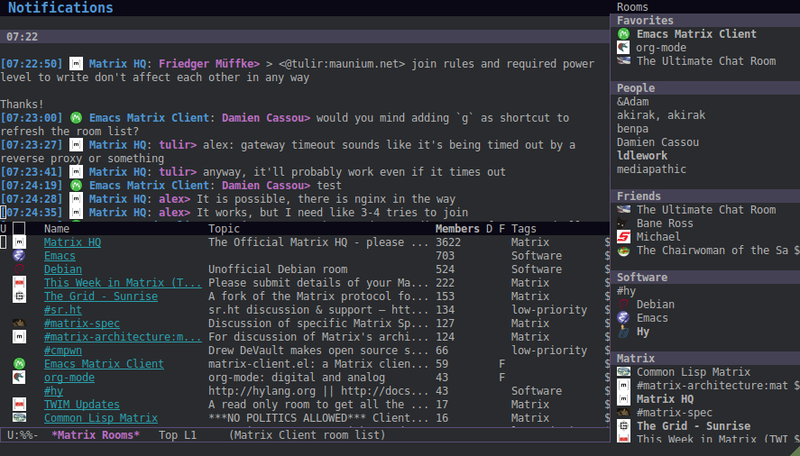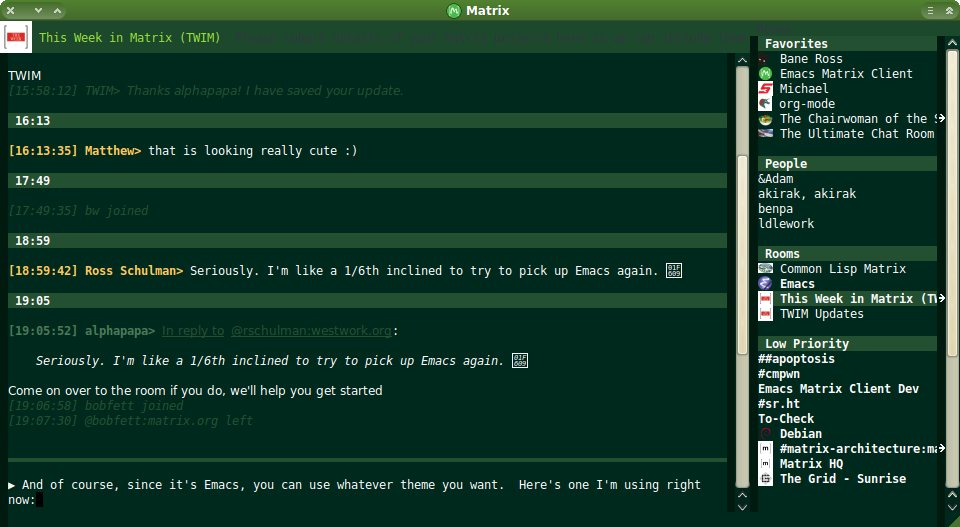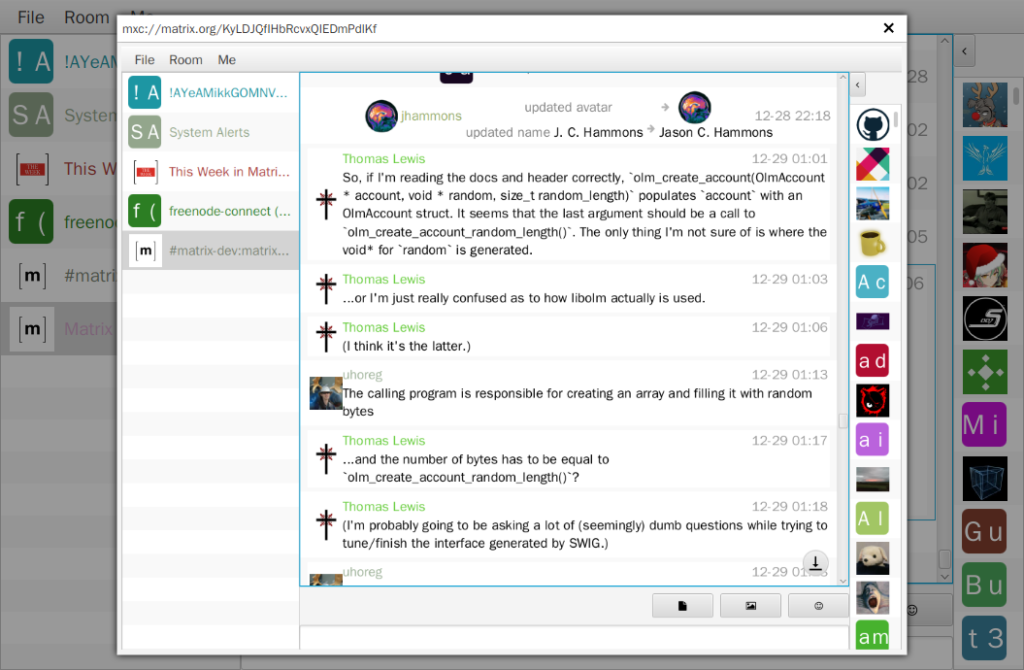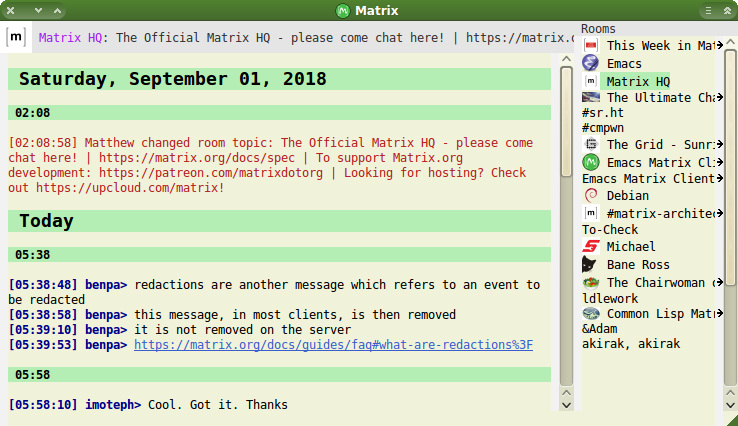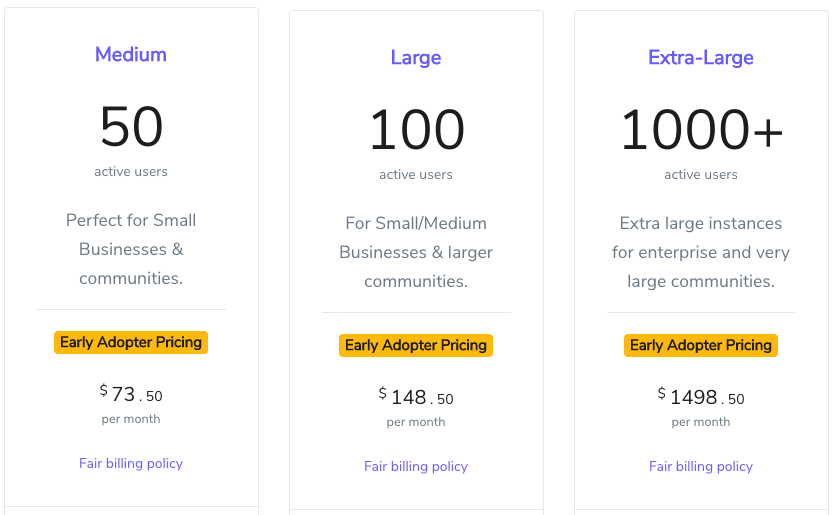This Week in Matrix 2019-01-11
2019-01-11 — This Week in Matrix — Neil Johnson🔗Welcome!
Do not panic, Benpa is away, I repeat, Benpa is away. Nonetheless TWIM lives on!
🔗Spec
Lots of spec work this week, and a shout out to anoa for his magical mscbot that provides pokes, nudges and updates on all things spec. Here's what mscbot had to say about the past week.
Approved MSCs
[MSC 1497]: Advertising support of experimental features in the CS API [MSC 1339]: Proposal to add a GET method to read account data [MSC 1501]: Room version upgrades
Final Comment Period
MSC 1708: .well-known support for server name resolution MSC 1711: X.509 certificate verification for federation connections
New and In Progress MSCs
[MSC 1794]: Federation v2 Invite API [MSC 1796]: Improved e2e notifications [MSC 1797]: Proposal for more granular profile error codes [MSC 1640]: Replace event IDs with hashes [MSC 1776]: Implementing peeking via /sync [MSC 1777]: peeking over federation [MSC 1779]: Proposal for Open Governance for Matrix.org (v2)
(A few may be missing as we're still tweaking mscbot :)
🔗Dendrite
Brendan had this to say:-
The Dendrite audit is over! A bunch of issues have been created on the Dendrite GitHub repository, as well as a project board in order to keep track of everything: https://github.com/matrix-org/dendrite/projects/2 There's a fair amount of issues that have been labeled as “good first issue”, so feel free to pick them up and open pull requests if you're looking into hacking on Dendrite! :)
And whilst we have your attention - here's Brendan & Matthew talking through the audit in this week's Matrix Live!
🔗Synapse
Neil says:-
both contain critical security updates so please update asap for more details, we'll be able to share a bit more about the vuln once admins have had a chance to upgrade.
Meanwhile Hawkowl has been cranking out bug fixes and perf improvements and in particular taking a look at taming the user_ips table.
While Debian packager Andrewsh adds:-
latest synapse (0.34.1.1, Python 3) in Debian, fixing CVE-2019-5885; an update to a previous release fixing this CVE uploaded to stretch-backports, using Python 2. Dependencies for a Python 3 upload approved in stretch-backports, a Python 3 upload of 0.34.1.1 will be following later this week
🔗Riot/iOS
Riot-iOS 0.7.11 has been released, with lots of bug fixes.
We have been working on e2e new screens (like key backup setup) and the re-skinning of the app.
🔗Riot/Android
Working to improve notifications style.
Split screen mode will be supported on next release!
Continuous autofocus on the Camera has been enabled.
Also fighting bugs on registration.
🔗Bridges
Halfshot has this to say:
Matrix-appservice-purple is being renamed to matrix-bifröst, on the basis that we now bridge to things and "burning rainbow bridge" seemed like a good description.
Other things that have happened: Performance improvements, as always. XMPP -> Matrix typing notifications XMPP -> Matrix avatars XMPP -> Matrix uploads * Matrix -> XMPP uploads (via oob)
and then follows up with this:-
As promised, we've got a discord bridge release out today. v0.4.0-rc1 has landed! See the change notes https://github.com/Half-Shot/matrix-appservice-discord/releases/tag/v0.4.0-rc1. Thank you to Sorunome for doing a huge amount of work on this!
@swedneck reports that:
linuxgaming.life is now running matrix-appservice-discord v0.4.0-rc1.
🔗Matrix.org Foundation
Matthew has a final draft of the Matrix.org Foundation governance document ready: https://github.com/matrix-org/matrix-doc/blob/matthew/msc1779/proposals/1779-open-governance.md. Comments on https://github.com/matrix-org/matrix-doc/pull/1779 would be much appreciated! We expect to propose merging it next week, and then incorporating it into the final Articles of the foundation.
🔗Riot Web
Loads and loads of work happening on https://riot.im/experimental which is now where all new development is happening as we race towards launching the new design. Highlights include:
- All new key verification is implemented! (in olm & matrix-js-sdk). We're currently hooking up the UX.
- Online key backup is pretty much finished.
- Cross-signing is up next.
- Redesign backlog is progressing (slightly stuck on making the RoomList resizing work nicely, but almost there)
- Finalising the all new registration/login screens
- ...and loads of other stuff too.
🔗Meanwhile...
Sending files landed in master branches of libQMatrixClient and Quaternion. Finally you can send your Quaternion screenshots (as any other images, jingles, cat videos etc.) to Matrix using Quaternion ;)
Also, libQMatrixClient is available as a Conan repository, for developers who'd like to use Conan to track dependencies.
Hello to all! I am write matrix bot for bridge messages between matrix and social network vk.com (russian analog of facebook). https://github.com/progserega/MatrixVkBot
matrix-client.el gained a room-list buffer, which can be sorted by unread status, name, number of members, etc, and has a right-click context menu like the room-list sidebar.
matrix-client.el gained right-click context menus in the room sidebar, allowing to set room priority, notifications, etc.
The matrix-client.el git repository has moved to: https://github.com/alphapapa/matrix-client.el
Stanislav N. aka pztrn reports that:
Hey guys, joined here to post another thing that works in Matrix https://gitlab.com/pztrn/check_mk_matrix_notifications it is a script that sends check_mk notifications to Matrix. Check_mk is a "plugin" for Nagios NMS.
It's not my update but I saw this HomeAssistant addon for matrix (https://github.com/hassio-addons/addon-matrix) and wanted to make sure it got a shoutout on TWIM. [Seeing how nobody else has posted it in here, just on twitter etc.]
Morgan McMillian (thrrgilag) reports that:
I published v1.0.1 of the pnut-matrix bridge this week which brings public pnut.io chat rooms to the matrix network. Features include syncing of pnut.io names and avatars, matrix users ability to authorize their pnut.io accounts, and administrative controls for managing linked rooms. Project can be found at https://gitlab.dreamfall.space/thrrgilag/pnut-matrix and discussion is at #pnut-matrix:monkeystew.net
ma1uta's MXToot deserves mention in the blog, and in https://matrix.org/docs/projects/try-matrix-now.html. People should not be wanting of Twitter over Decentralized-Federated F(L)OSS feeds in their Matrix room.
in the koma project, the desktop client continuum now does a full sync when the user account doesn't seem to have joined any chat rooms, this way, it can recover from some disk IO errors, or more commonly, unclean shutdowns. A ca-certificates issue with Java 11 on Debian stable was found while running a bot on a headless server, more details and the solution is in the README
Our first specs proposal of 2019 just landed in the form of SCS #16, which specifies the data/event structure for trust authorities. This is a big step as TAs play a key role in Informo's trust/reputation system!
In the meantime, we've also opened SCS #19, which proposes a rework of the specs' introduction with the idea to give newcomers a more accessible and immediate way to figure out what Informo is about, and give them some starting points so they can dive deeper into it if interested. It's a rather small one and we'd love people to give it a look so we can aim for the most newcomer-friendly version possible
We've also just opened SCS #21 which specifies a way for a source to change the Matrix user it uses to publish articles (e.g. if it was previously using a server managed by non trustworthy people). As with all of our proposals introducing changes in behaviour, it's open for people to share their comments on it for the next 7 days.
The first alpha release for mxisd v1.3.0 has been released with already major performance improvements. Early testing and reporting about success/failure would be very much appreciated as v1.3.0 will break backward compatibility. We have been running it on our own servers for about a week now and feels really good and stable.
I just launched OI Chat, a matrix service dedicated to Blockstack users (https://www.producthunt.com/posts/oi-chat).
It is a home server that does not rely on any passwords but on cryptography and user-owned storage.
OI Chat uses one-time logins to verify the ownership of a username that can only be created by the user if they control the blockstack account.
...and that's all this week, folks! Your normal hand-crafted artisanal benpa confectionery will be back next week.

